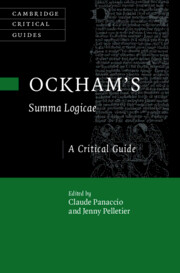Book contents
- Frontmatter
- Contents
- Contributors
- Abbreviations of Ockham’s Works
- Introduction
- Chapter 1 Metaphysical Methodology in Ockham’s Summa Logicae I
- Chapter 2 Ockham and Syncategoremata
- Chapter 3 Ockham on Metalanguage
- Chapter 4 Ockham’s Moderate Modism
- Chapter 5 Relations in Summa Logicae
- Chapter 6 The Threat of Pernicious Ambiguity
- Chapter 7 Ontology and Ockham’s Account of Truth Conditions for Tensed Propositions
- Chapter 8 Ockham’s Theory of the Categorical Syllogism
- Chapter 9 Ockham’s Modal Logic
- Chapter 10 Theory of Demonstration
- Chapter 11 The Obligationes of William of Ockham
- Chapter 12 Ockham on the Liar Paradox
- Chapter 13 Ockham on Figurative Discourse
- Bibliography
- Index
- Cambridge Critical Guides
Chapter 10 - Theory of Demonstration
What Is Demonstrable in a Contingent World?
Published online by Cambridge University Press: 04 September 2025
- Frontmatter
- Contents
- Contributors
- Abbreviations of Ockham’s Works
- Introduction
- Chapter 1 Metaphysical Methodology in Ockham’s Summa Logicae I
- Chapter 2 Ockham and Syncategoremata
- Chapter 3 Ockham on Metalanguage
- Chapter 4 Ockham’s Moderate Modism
- Chapter 5 Relations in Summa Logicae
- Chapter 6 The Threat of Pernicious Ambiguity
- Chapter 7 Ontology and Ockham’s Account of Truth Conditions for Tensed Propositions
- Chapter 8 Ockham’s Theory of the Categorical Syllogism
- Chapter 9 Ockham’s Modal Logic
- Chapter 10 Theory of Demonstration
- Chapter 11 The Obligationes of William of Ockham
- Chapter 12 Ockham on the Liar Paradox
- Chapter 13 Ockham on Figurative Discourse
- Bibliography
- Index
- Cambridge Critical Guides
Summary
This chapter presents Ockham’s theory of demonstration in Summa Logicae III-2, the syllogism that produces scientific knowledge. He relies on Aristotle’s Posterior Analytics and Grosseteste’s commentary it. Grosseteste, however, founded the necessity of demonstration on necessary relations in the world. For Ockham, the main challenge is to elaborate a theory of science that addresses the singular beings in a contingent world. His theory is characterized by a conception of purely logical necessity, a semiotic conception of cause, and the requirement that subject terms must have reference in order for affirmative propositions to be true. Many propositions about the natural world are not susceptible to demonstration in the strict sense, but Ockham distinguishes different kinds of demonstration. He is not so much trying to limit the field of demonstrable natural knowledge as to relax the meaning of demonstrability so that it includes many dubitable propositions that can be made evident.
Information
- Type
- Chapter
- Information
- Ockham’s Summa LogicaeA Critical Guide, pp. 210 - 230Publisher: Cambridge University PressPrint publication year: 2025
